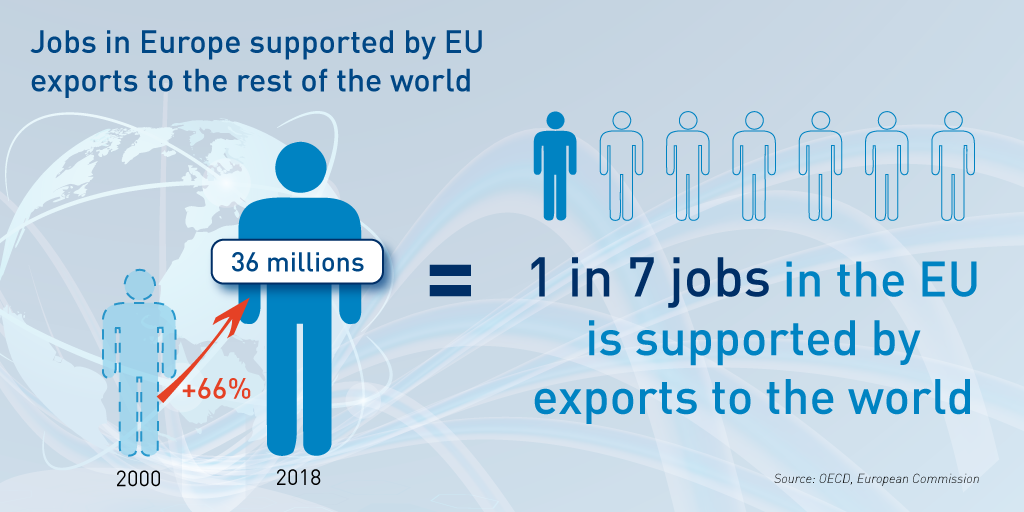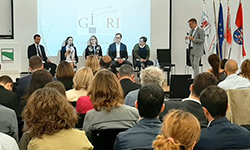BusinessEurope Headlines No. 2019-26
EU-Mercosur trade agreement: why is it a good idea?

Uniting 780 million citizens, the trade agreement with Mercosur is the biggest ever concluded by the EU. It is going to be a game changer in a region with a huge untapped potential, where European businesses have been able to establish a certain business presence but still face a number of different obstacles. The Mercosur countries have so far been very closed to foreign companies and this explains why the level of ambition is somewhat lower than that of deals in force with Japan or Canada.
The protection of geographical indications is an unhoped-for success in countries with such strong cultural ties to Europe and leaves the USA as the only big player in the American continent who has not adopted the EU system. Tariff peaks that were effectively prohibitive will be dismantled in a reasonable period of time. High-level standards in sanitary and phytosanitary measures as well as the elimination of certain export taxes and restrictions address long term requests from European business. The Paris agreement is enshrined in the strongest way ever in an agreement concluded by the EU. These are just but a few of the positive elements of the agreement.
Beyond the economic rationale, the strategic dimension of the deal is central to BusinessEurope’s strong support. We live in difficult times when international trade suffers from volatility and is negatively affected by increasing protectionism and unilateral measures. The EU needs allies. Furthermore, as it is increasingly likely that the World Trade Oragnisation (WTO) dispute settlement mechanism will be severely impaired in the next future, bilateral agreements will provide an alternative framework to settle disputes that may arise with our trading partners.
In order to realize the promised potential, the EU will have to be fast in the next steps towards entry into force. Mercosur has decided to embrace the path of open trade and has turned into a dynamic player that is negotiating agreements with a number of other partners. A lengthy ratification process may jeopardise the first-mover advantage that European businesses are looking forward to.
Contact: Eleonora Catella
Facts and Figures

Our comment
An ambitious EU industrial strategy
 Why? Deep transformations and fast-changing world
Why? Deep transformations and fast-changing world
The EU’s future is closely linked with the future of its industry. Internal and external challenges are placing growing pressure on our societies, while also creating new opportunities. Deep societal transformation, and a fast-changing world call for an urgent change in attitude. As the world’s second largest economy, the EU should aim to master these challenges while improving the EU’s industrial competitiveness. The time to do so is now.
The need to tackle climate change involves fundamental societal and industrial transformations that can happen only through strong collaborative efforts between business, governments, science and society at large. The challenge is to develop climate-neutral solutions and technologies, while preserving Europe’s competitiveness, prosperity and jobs. EU industry plays a key role in the transformation to a climate-neutral economy and society, by offering practical and concrete solutions to reach the common objectives.
Another major trend is the ongoing deep and disruptive transformation of our economy through digitisation and the application of artificial intelligence, which are putting pressure on Europe’s competitiveness. Besides this, Europe also faces unprecedented technological competition and aggressive industrial strategies from major competitors like the US and China, as well as the emergence of economic powers such as India. Europe must carve out its future position within a more competitive, less rules-based international environment, characterised by emerging economies moving rapidly up the value chain. The situation is exacerbated by growing geopolitical tensions, affecting access to raw materials and critical infrastructures.
A strong and competitive EU industry delivering value for EU citizens, the environment and the economy is the basis for an inclusive society that enables us to deal with current and future challenges and grasp opportunities that arise. The way we will develop our industry’s competitiveness, in which direction we take it, will to a great extent determine Europe’s future relevance as a global player.
Hence, a new sense of urgency for an industrial strategy that brings a forward-looking competitiveness agenda for Europe is very welcome and needed. The report of the Industry 2030 high-level industrial roundtable provides a valuable contribution to this debate.
What? A more pro-active and common strategic approach
Europe needs to become more pro-active and strategic than in the past. This does not mean that Europe should move towards protectionism. Becoming inward-looking would be harmful for Europe. With half of European business in global value chains, a closed Europe would only hurt us. This does also not mean that it is just about reacting to what is happening in other parts of the world. It calls for making sure that we collectively do everything we have agreed to do, implementing the right reforms, taking more strategic decisions, positioning ourselves stronger in international competition and looking more closely into strategic value chains.
Businesses need enabling conditions and, in some cases, public authorities will need to support and co-invest more intensively in strategic areas for Europe’s future global competitiveness and stronger autonomy in critical technologies and infrastructure. In particular timing and agile frameworks are crucial for the EU to become more dynamic in mobilising the necessary resources rapidly. While this close collaboration between public and private actors is key, we must not enter into a new era of interventionism where the state “picks winners”, thereby limiting and hindering other business action and competition as a whole.
The new EU industrial strategy needs to build on two pillars. First, a solid set of framework conditions that incentivise companies of all sizes to improve their performance, invest and safeguard the EU’s economic resilience. Second, a more strategic approach to value chains that are key to EU industrial competitiveness and technological leadership.
Better framework conditions for all
The basis for success will be to ensure that all sectors and companies in Europe are strong enough to operate in an environment that enables them to face foreign competition. For this to happen, European legislation must be clear, simple and fit for purpose. European companies can see their competitiveness being undermined by burdensome rules and bureaucracy, high taxes and competitors that do not operate on a level playing field. Improving the framework conditions (i.e. trade, competition, research and innovation, energy, intellectual property, investments, skills, etc.)[1] will be crucial to enable companies to grow and prepare themselves for fierce competition and must therefore be at the core of the action. A key instrument is a competitive and well-functioning single market, and there is much to be done in terms of implementation and compliance, not least on services and the digital economy.
Focus on strategic value chains
A more pro-active approach is necessary to make the EU more strategic than in the past. It should foster industrial cross border cooperation and networks around value chains that are key to the EU’s industrial competitiveness and strategic autonomy. For instance, the work around microelectronics, batteries, low-carbon industries, hydrogen or cybersecurity is important to position the EU in areas of key technologies and to find solutions to societal challenges.
In particular, the strategy should smooth the way for a pooling of public and private resources, including investments, at the critical phase of moving technologies from labs to first industrial deployment and commercialisation. This is the moment where public support may be necessary to fill the financial gap to overcome market failures.
Therefore, the on-going work by the Strategic Forum on Important Projects of Common European Interest (IPCEI) should be further developed, in a clear and transparent process. Building on the first experiences, the IPCEI instrument should be kept in check to make sure it is agile enough to cope with a fast-changing global playing field.
To conclude
The governance and policies of European institutions during the next political cycle will need to fully capture the urgent need for a more proactive and strategic approach to industrial policy, building on a fair, competitive and agile business environment, aiming at global leadership in technology, innovation and sustainability and focusing on strategic value chains.
[1] BusinessEurope is preparing specific recommendations on these policy fields for the next EU political cycle.
Contact: Alexandre Affre
EU needs to prioritise research and innovation
 “To remain a leading economy in the world, stand up to societal challenges and be relevant to citizens, Europe needs to prioritise research and innovation in its political agenda”, said Alexandre Affre, Director for Industrial Affairs, at the Giuri Annual Event “Horizon Europe – The way forward”, on 11 July in Brussels. “EU Framework Programmes for Research and Innovation have been key to boost Europe’s competitiveness and address Sustainable Development Goals (SDGs). To secure real impact, the budget of Horizon Europe should be raised to at least €120 billion”, he added. Alexandre explained that this amount is essential to unlock private funds and reduce the research, development and innovation (RDI) gap. It is also important that 60% of Horizon Europe budget is allocated to the “Global Challenges and European Industrial Competitiveness” pillar, so as to enable ambitious collaborative projects in important industrial key areas and bring technologies to the market.
“To remain a leading economy in the world, stand up to societal challenges and be relevant to citizens, Europe needs to prioritise research and innovation in its political agenda”, said Alexandre Affre, Director for Industrial Affairs, at the Giuri Annual Event “Horizon Europe – The way forward”, on 11 July in Brussels. “EU Framework Programmes for Research and Innovation have been key to boost Europe’s competitiveness and address Sustainable Development Goals (SDGs). To secure real impact, the budget of Horizon Europe should be raised to at least €120 billion”, he added. Alexandre explained that this amount is essential to unlock private funds and reduce the research, development and innovation (RDI) gap. It is also important that 60% of Horizon Europe budget is allocated to the “Global Challenges and European Industrial Competitiveness” pillar, so as to enable ambitious collaborative projects in important industrial key areas and bring technologies to the market.
Contact: Carolina Vigo
Calendar
- 22 July: New UK Prime Minister
- 24-26 August: G7 Summit
- 12 September: Next edition of the Headlines
- 23 September: HELweCan! – Boosting skills & continuous learning
- 24 September: European Research & Innovation Days
Reminder: please have a look at our privacy policy